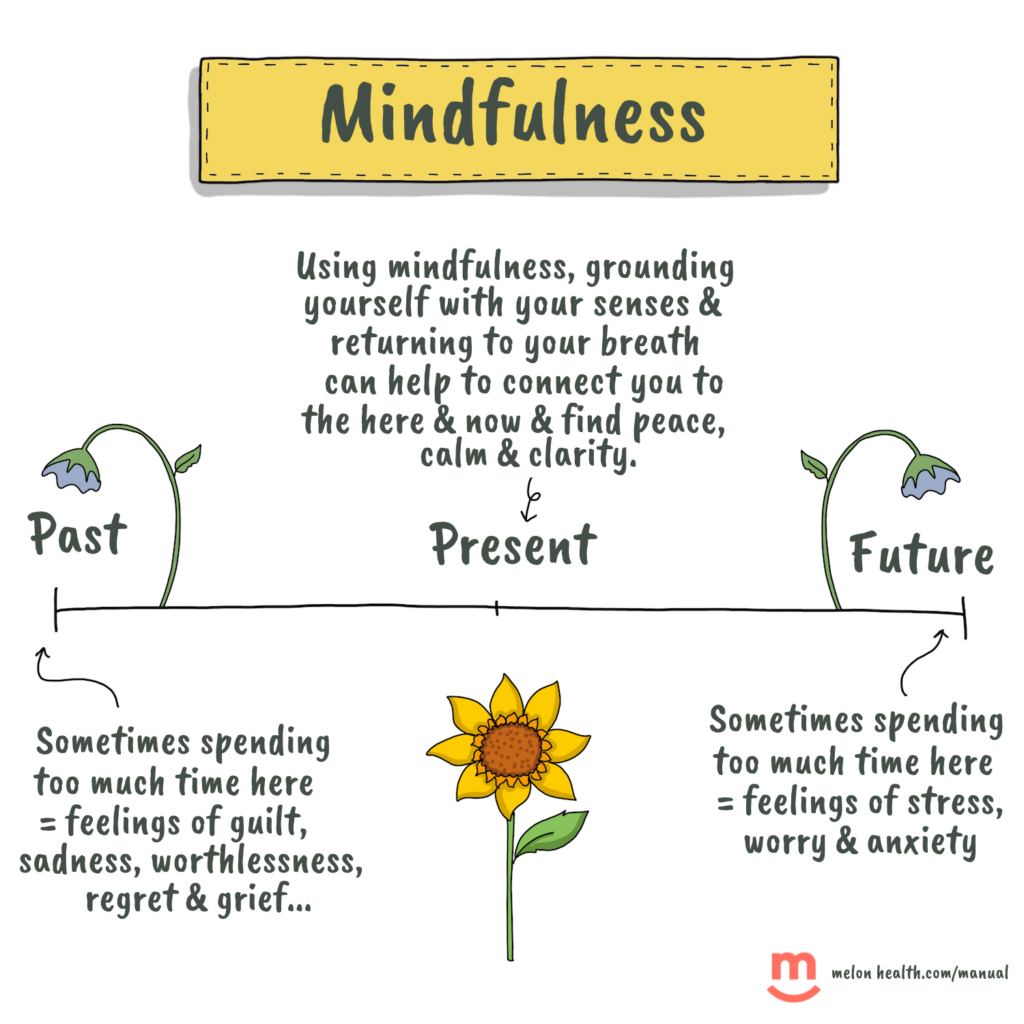What is mindfulness? And how can I start to be more mindful?
‘Mindfulness’ simply means paying attention to the present moment. Practising mindfulness can help you to cope with everyday life and deal with tough times. This is confirmed by extensive research, which has found that mindfulness reduces stress and anxiety. It can also help you to concentrate, relax and be more productive.
The best way to decide if mindfulness is for you is to give it a crack! Here are some different ways you can practise mindfulness, tips for what to do if you’re finding it hard, and ways you can incorporate mindfulness into your daily routine.
Focus only on the present moment
You can develop mindfulness during regular activities such as when walking, driving or even while brushing your teeth. The key is to try and focus only on the present moment and not pay too much attention to your thoughts about the past or the future.
When you concentrate on what’s happening around you, you’re less likely to get caught up in your thoughts. Ask yourself whether you feel hot or cold. What does the air feel like on your face? What sounds can you hear? What can you smell? Is your breathing slow or fast? Are you tired? Are you hungry? How do you feel?
Try not to be judgmental about anything you notice
This is tricky to do, but try not to label things as ‘good’ or ‘bad’. Just notice things and let them be. For example, instead of labeling a particular smell as ‘bad’, just notice it without judging it.
Practise mindful breathing
Take a few extra minutes to focus on your breathing. You can do this with your eyes closed or open. What does your breathing feel like? What does it sound like? Where do you first feel the breath in your body?

If you’re ready to go a little deeper into developing your mindfulness, consider mindful meditation. To do this, sit quietly with your eyes closed and focus on your breath, or on a word or a phrase that you repeat quietly. If you find your mind is wandering, it doesn’t mean you’re doing anything wrong. It just means you have a normal human mind! Gently lead your thoughts back to your breathing, or to the word or phrase you’ve chosen. You can practise mindful meditation by yourself, or you can use an app (such as Headspace or Smiling Mind) if you want some guidance.
What if I’m finding it hard?
Becoming more mindful involves training your brain, so, like most things you learn, it can take time. Be patient. Also, see below for tips on how to incorporate mindfulness into your daily routine.
Remember:
Don’t expect to be able to hold your focus for very long, especially when you’re just getting started.
It’s completely normal for your thoughts to wander.
The goal isn’t to have a totally ‘blank’ mind; it’s more about noticing and gently guiding your mind back when your thoughts do wander.
The more you practise mindfulness, the better you’ll become at it.
If you’re struggling with a particular strategy, try a different one. Every person is different, and you may find some strategies easier than others.
The following tips will help you incorporate mindfulness into your everyday routine.
Wash the dishes (yes, really!)
No, your mum hasn’t hacked our site; this is legit. When you wash the dishes after dinner, do you usually think about everything you still have to do before you can finally relax? Instead, try focusing only on washing the dishes. Start by listening to the sink fill up with water. Feel the warm water on your hands, and smell the dishwashing liquid. When you notice your mind wandering (and it will!), bring your attention back to your senses. What can you see/hear/smell/feel? If you just can’t get on board with dishes, read on…
Write a ‘thank you’ list
Is ‘gratitude’ another one of those words that make you squirm? If so, think of it as a ‘thank you’ list. Writing a ‘thank you’ list is one way to slow down and appreciate the small (and big) things in your life. It doesn’t need to be massively long; you could just write down three things you’re thankful for. Maybe it’s the delicious breakfast you had this morning, the support and love you get from your friends, or the courage you found to speak up for yourself the other day.
Make it your mission to write three things in a ‘thank you’ note every day!
Have a quick stretch
We sometimes get so caught up in our thoughts that we forget about everything else. But when we take a moment to focus on our body, such as by doing some stretching exercises, it gives us a break from our headspace. Take your time, and focus on how your body feels.
Eat a snack
You’re probably wondering how eating a snack can be mindful, right? The best place to start is by focusing on what you’re eating, rather than on your thoughts (or the Netflix show you’re watching). So, instead of mindlessly eating that bag of popcorn and then wondering where it all went, take your time and pay attention to every mouthful. Notice the delicious taste as you chew the food, feel the textures, savour the aroma. It helps to put down your phone while you eat, too.